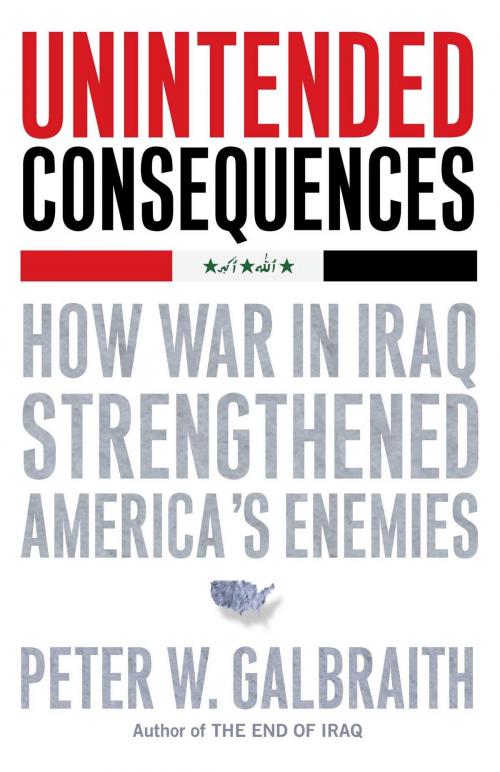Unintended Consequences
How War in Iraq Strengthened America's Enemies
Nonfiction, History, Americas, United States| Author: | Peter W. Galbraith | ISBN: | 9781416562306 |
| Publisher: | Simon & Schuster | Publication: | September 30, 2008 |
| Imprint: | Simon & Schuster | Language: | English |
| Author: | Peter W. Galbraith |
| ISBN: | 9781416562306 |
| Publisher: | Simon & Schuster |
| Publication: | September 30, 2008 |
| Imprint: | Simon & Schuster |
| Language: | English |
Called by New York Times columnist David Brooks the "smartest and most devastating" critic of President George W. Bush's Iraq policies, Peter Galbraith was the earliest expert to describe Iraq's breakup into religious and ethnic entities, a reality now commonly accepted.
The Iraq war was intended to make the United States more secure, bring democracy to the Middle East, intimidate Iran and Syria, help win the war on terror, consolidate American world leadership, and entrench the Republican Party for decades. Instead,
- Bush handed Iran its greatest strategic triumph in four centuries
- U.S. troops now fight to support an Iraqi government led by religious parties intent on creating an Iranian-style Islamic republic
- As part of the surge, the United States created a Sunni militia led by the same Baathists the U.S. invaded Iraq to overthrow administration gave Iran and North Korea a free pass to advance their nuclear programs
- Obsessed with Iraq's nonexistent WMD, the Bush administration gave Iran and North Korea a free pass to advance their nuclear programs
- Turkey, a key NANATO ally long considered a model pro-Western Muslim democracy, became one of the most anti-American countries in the world
- U.S. prestige around the world reached an all-time low
Iraq: Galbraith challenges the assertion that the surge will lead to victory. By creating a Sunni army, the surge has, in fact, contributed to Iraq's breakup and set the stage for an intensified civil war between Sunnis and Shiites. If the United States wishes to escape the Iraq quagmire, it must face up to the reality that the country has broken up and cannot be put back together.
Iran: Having helped Iran's allies take control in Baghdad, the Bush administration no longer has a viable military option to stop Iran's nuclear program. Galbraith discusses how a president more pragmatic than Bush might get Iran to freeze its nuclear program as part of a package deal to upgrade relations between two countries equally threatened by Sunni extremism.
Turkey, Syria, and Israel: A war intended to make Israel more secure, undermine Syria's Assad regime, and strengthen ties with Turkey has had the opposite result.
Nationalism: In the coming decades, other countries may follow Iraq's example in fragmenting along ethnic and religious lines. Galbraith draws on his considerable experience in Iraq and the former Yugoslavia to predict where and what the United States might do about it.
The United States: George W. Bush substituted wishful thinking for strategy and as a result made America weaker. Galbraith provides some rules for a national strategy that will appeal equally to conservatives and liberals -- indeed, to anyone who believes the United States needs an effective national security strategy.
Called by New York Times columnist David Brooks the "smartest and most devastating" critic of President George W. Bush's Iraq policies, Peter Galbraith was the earliest expert to describe Iraq's breakup into religious and ethnic entities, a reality now commonly accepted.
The Iraq war was intended to make the United States more secure, bring democracy to the Middle East, intimidate Iran and Syria, help win the war on terror, consolidate American world leadership, and entrench the Republican Party for decades. Instead,
- Bush handed Iran its greatest strategic triumph in four centuries
- U.S. troops now fight to support an Iraqi government led by religious parties intent on creating an Iranian-style Islamic republic
- As part of the surge, the United States created a Sunni militia led by the same Baathists the U.S. invaded Iraq to overthrow administration gave Iran and North Korea a free pass to advance their nuclear programs
- Obsessed with Iraq's nonexistent WMD, the Bush administration gave Iran and North Korea a free pass to advance their nuclear programs
- Turkey, a key NANATO ally long considered a model pro-Western Muslim democracy, became one of the most anti-American countries in the world
- U.S. prestige around the world reached an all-time low
Iraq: Galbraith challenges the assertion that the surge will lead to victory. By creating a Sunni army, the surge has, in fact, contributed to Iraq's breakup and set the stage for an intensified civil war between Sunnis and Shiites. If the United States wishes to escape the Iraq quagmire, it must face up to the reality that the country has broken up and cannot be put back together.
Iran: Having helped Iran's allies take control in Baghdad, the Bush administration no longer has a viable military option to stop Iran's nuclear program. Galbraith discusses how a president more pragmatic than Bush might get Iran to freeze its nuclear program as part of a package deal to upgrade relations between two countries equally threatened by Sunni extremism.
Turkey, Syria, and Israel: A war intended to make Israel more secure, undermine Syria's Assad regime, and strengthen ties with Turkey has had the opposite result.
Nationalism: In the coming decades, other countries may follow Iraq's example in fragmenting along ethnic and religious lines. Galbraith draws on his considerable experience in Iraq and the former Yugoslavia to predict where and what the United States might do about it.
The United States: George W. Bush substituted wishful thinking for strategy and as a result made America weaker. Galbraith provides some rules for a national strategy that will appeal equally to conservatives and liberals -- indeed, to anyone who believes the United States needs an effective national security strategy.















